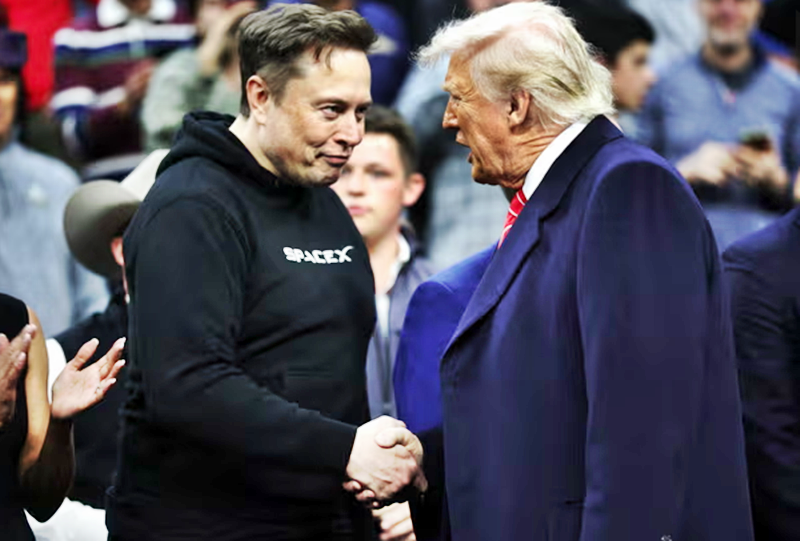Under Trump and Musk, billionaires wield unprecedented influence over US national security

By Guardian-James Risen-Sun 6 Apr 2025 18.00 BST
Government officials and contractors long controlled spy operations. Now the likes of Musk and Bezos are in control.
Just days before Donald Trump’s inauguration in January, Blue Origin, the space company owned by billionaire Jeff Bezos, launched its New Glenn rocket, named for John Glenn, the Mercury astronaut who was the first American to orbit the Earth. Around 2am on 16 January, the 30-story rocket powered by seven engines blasted off into the Florida night from Cape Canaveral’s historic launch complex 36, which first served as a Nasa launch site in 1962.
The flight’s end was marred by a failure to bring the booster rocket back for further use, but the successful launch and orbit still marked a watershed moment for Blue Origin in its bid to compete with SpaceX, the company owned by Elon Musk, for dominance over American spy satellite operations. During the Trump administration, it is likely that both companies will play significant roles in placing spy satellites into Earth orbit, which could mean that the United States intelligence community will be beholden to both Bezos and Musk to handle the single most complex and expensive endeavor in modern espionage.
In fact, Musk and Bezos are in a position during the Trump administration to personally exert significant influence over the direction of the Central Intelligence Agency, the National Security Agency and the rest of the US national security apparatus. The two pro-Trump billionaires have already been awarded massive contracts with the US intelligence community, including some that predate Trump’s first term in office.
The emergence of Musk, Bezos and a handful of other pro-Trump billionaires as key players in US intelligence marks a radical change in US spy operations, which have traditionally been controlled by career government officials working closely with a few longstanding defense and intelligence contractors, giant corporations such as Lockheed Martin, RTX and Northrop Grumman that are adept at lobbying both Democrats and Republicans in Washington.
But with Musk, Bezos and other pro-Trump Silicon Valley figures gaining an edge through their personal ties to Trump, civil servants in the intelligence community may be reluctant to deny them ever-larger contracts, especially since Trump has already fired several inspectors general who investigated Musk’s businesses in other areas of the government.
Anticipating big rewards, Musk is reportedly joining forces with other pro-Trump billionaires to try to carve up the defense and intelligence business. SpaceX is working with Palantir, a hi-tech data analytics intelligence contractor co-founded by Peter Thiel, one of the most prominent rightwing figures in Silicon Valley; Anduril, a new defense contractor founded by 32-year-old pro-Trump tech bro Palmer Luckey; and several other Silicon Valley firms to form a consortium geared towards loosening the grip of the defense industry’s traditional players.
Tech leaders eager to get into intelligence contracting have long complained that the business has become so consolidated around a few big players that it is nearly impossible for outsiders to compete, leading to a lack of innovation. “Consolidation bred conformity,” argued Shyam Sankar, the chief technology officer of Palantir, in a widely read public memo, The Defense Reformation.
Swapping one oligarchy for another
It is hard to separate Silicon Valley’s calls for breaking up the oligarchy now controlling the defense and intelligence business from the eagerness of pro-Trump tech bros to grab as much power and cash as possible while creating a new oligarchy of their own.
“The idea of overturning the contracting process did intrigue me, but now, under Trump, I think it is just about greed,” observed Greg Treverton, a former director of the National Intelligence Council, the intelligence community’s top analytical arm. “Now, with Trump, it is mostly about money and connections.”
In the eyes of their critics, tech entrepreneurs offer a simplistic, black-and-white picture of the defense and intelligence business in which Silicon Valley conveniently has all the answers.
“Beware the instant expert,” said Peter Singer, a defense analyst at the New America Foundation. “It’s like they are saying ‘I watched a YouTube video and now I know everything.’ They have this narrative that only Silicon Valley can drive innovation.”
Elon Musk, satellite spymaster
As he eagerly slashes and burns through the ranks of federal employees with his Doge apparatus, Musk has emerged as the most powerful and polarizing figure in the Trump administration. But what is less well known is that Musk has also gained an influential role in the US intelligence community despite never having served inside the spy world.
Musk’s SpaceX has already become one of the main rocket contractors launching American spy satellites and is seeking to overcome the edge held by United Launch Alliance, a joint venture between Boeing and Lockheed Martin, the traditional giant in the niche. In addition, Starlink, Musk’s commercial satellite communication network, is playing a critical role in US foreign policy, providing internet service in remote regions of the world including in Ukraine, where it operates a communications network for the Ukrainian army.
Starlink’s role in the Ukraine war has placed Musk squarely in the middle of the dispute between Trump and the Ukrainian president, Volodymyr Zelenskyy. Meanwhile, questions about whether Musk is assuming a dual role as both a player in Trump’s national security policymaking and a major contractor grew after he received a private briefing at the Pentagon on 21 March and visited the CIA headquarters 10 days later.
SpaceX has a head start over Blue Origin in the spy satellite business, and Musk has a big lead over Bezos in Trump world. But Blue Origin and Bezos are working hard to catch up in both.
